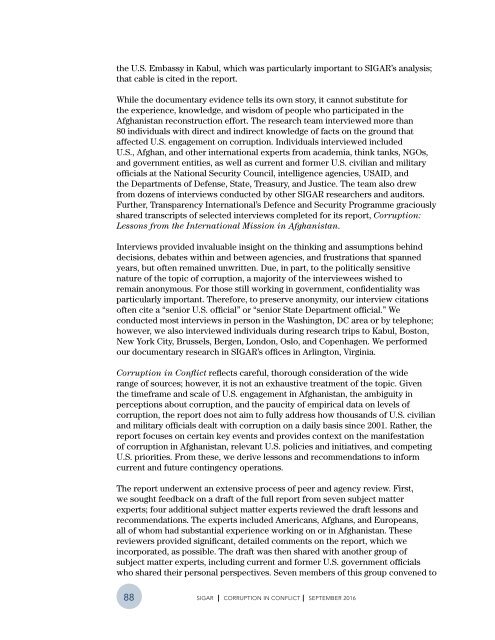CORRUPTION IN CONFLICT
5IlaWjQej
5IlaWjQej
Create successful ePaper yourself
Turn your PDF publications into a flip-book with our unique Google optimized e-Paper software.
the U.S. Embassy in Kabul, which was particularly important to SIGAR’s analysis;<br />
that cable is cited in the report.<br />
While the documentary evidence tells its own story, it cannot substitute for<br />
the experience, knowledge, and wisdom of people who participated in the<br />
Afghanistan reconstruction effort. The research team interviewed more than<br />
80 individuals with direct and indirect knowledge of facts on the ground that<br />
affected U.S. engagement on corruption. Individuals interviewed included<br />
U.S., Afghan, and other international experts from academia, think tanks, NGOs,<br />
and government entities, as well as current and former U.S. civilian and military<br />
officials at the National Security Council, intelligence agencies, USAID, and<br />
the Departments of Defense, State, Treasury, and Justice. The team also drew<br />
from dozens of interviews conducted by other SIGAR researchers and auditors.<br />
Further, Transparency International’s Defence and Security Programme graciously<br />
shared transcripts of selected interviews completed for its report, Corruption:<br />
Lessons from the International Mission in Afghanistan.<br />
Interviews provided invaluable insight on the thinking and assumptions behind<br />
decisions, debates within and between agencies, and frustrations that spanned<br />
years, but often remained unwritten. Due, in part, to the politically sensitive<br />
nature of the topic of corruption, a majority of the interviewees wished to<br />
remain anonymous. For those still working in government, confidentiality was<br />
particularly important. Therefore, to preserve anonymity, our interview citations<br />
often cite a “senior U.S. official” or “senior State Department official.” We<br />
conducted most interviews in person in the Washington, DC area or by telephone;<br />
however, we also interviewed individuals during research trips to Kabul, Boston,<br />
New York City, Brussels, Bergen, London, Oslo, and Copenhagen. We performed<br />
our documentary research in SIGAR’s offices in Arlington, Virginia.<br />
Corruption in Conflict reflects careful, thorough consideration of the wide<br />
range of sources; however, it is not an exhaustive treatment of the topic. Given<br />
the timeframe and scale of U.S. engagement in Afghanistan, the ambiguity in<br />
perceptions about corruption, and the paucity of empirical data on levels of<br />
corruption, the report does not aim to fully address how thousands of U.S. civilian<br />
and military officials dealt with corruption on a daily basis since 2001. Rather, the<br />
report focuses on certain key events and provides context on the manifestation<br />
of corruption in Afghanistan, relevant U.S. policies and initiatives, and competing<br />
U.S. priorities. From these, we derive lessons and recommendations to inform<br />
current and future contingency operations.<br />
The report underwent an extensive process of peer and agency review. First,<br />
we sought feedback on a draft of the full report from seven subject matter<br />
experts; four additional subject matter experts reviewed the draft lessons and<br />
recommendations. The experts included Americans, Afghans, and Europeans,<br />
all of whom had substantial experience working on or in Afghanistan. These<br />
reviewers provided significant, detailed comments on the report, which we<br />
incorporated, as possible. The draft was then shared with another group of<br />
subject matter experts, including current and former U.S. government officials<br />
who shared their personal perspectives. Seven members of this group convened to<br />
88 SIGAR I <strong>CORRUPTION</strong> <strong>IN</strong> <strong>CONFLICT</strong> I SEPTEMBER 2016


